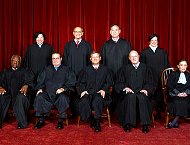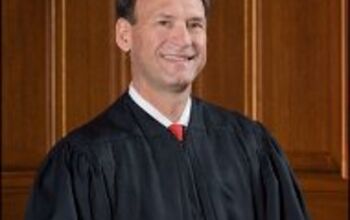US Supreme Court Wrestles With GPS Surveillance of Automobiles
The US Supreme Court earlier this month heard oral arguments in a case that will set the legal boundaries for police GPS surveillance of automobiles. Last year, the US Court of Appeals for the DC Circuit ruled that police were wrong to spend a month tracking the every move of Antoine Jones, who was arrested on October 24, 2005 for drug possession ( view opinion). A tracking device had been attached to Jones’s Jeep without judicial approval. The high court judges engaged in heated debate about the rights of motorists in connection with the Fourth Amendment.
“It seems to me the heart of the problem that’s presented by this case and will be presented by other cases involving new technology is that in the pre-computer, pre-Internet age much of the privacy — I would say most of the privacy — that people enjoyed was not the result of legal protections or constitutional protections; it was the result simply of the difficulty of traveling around and gathering up information,” Justice Samuel Alito summarized. “But with computers, it’s now so simple to amass an enormous amount of information about people that consists of things that could have been observed on the streets, information that was made available to the public.”
The administration, represented by Deputy Solicitor General Michael R. Dreben, argued that police do not need to obtain a warrant because location information could have been obtained this information through ordinary surveillance methods. That means anyone could track even supreme court justices without violating their privacy.
“So your answer is yes, you could tomorrow decide that you put a GPS device on every one of our cars, follow us for a month; no problem under the Constitution?” Chief Justice John Roberts said. “Your argument is, it doesn’t depend how much suspicion you have, it doesn’t depend on how urgent it is. Your argument is you can do it, period. You don’t have to give any reason. It doesn’t have to be limited in any way.”
Roberts suggested the process of obtaining a warrant serves as an effective limit. Scalia seemed to suggest that state legislatures were best suited to decide what limits should be placed on police tracking, not the courts. Other justices worried about the implications of allowing unrestricted tracking.
“[It’s] an easy way, to pick someone up for speeding when you suspect something far worse but have no probable cause,” Justice Ruth Bader Ginsburg said. “It’s all in the computer. The police can say, we want to find out more about X, so consult the database, see if there is an indication that he was ever speeding in the last 28 days.”
Justice Anthony M. Kennedy compared the GPS tracking to the use of speed cameras and red light cameras for tracking purposes.
“Lots of communities have, including Washington, cameras on — at intersections on stop lights,” Kennedy said. “Suppose the police suspected someone of criminal activity and they had a computer capacity to take pictures of all the intersections that he drove through at different times of day, and they checked his movements and his routes for five days. Would that be lawful?”
Justice Elena Kagan suggested constant police surveillance of an individual is obviously a violation of privacy.
“If you think about this, and you think about a little robotic device following you around 24 hours a day anyplace you go that’s not your home, reporting in all your movements to the police, to investigative authorities, the notion that we don’t have an expectation of privacy in that, the notion that we don’t think that our privacy interests would be violated by this robotic device, I’m — I’m not sure how one can say that,” Kagan said.
The justices are expected to arrive at a decision by spring.
[Courtesy: Thenewspaper.com]
More by The Newspaper
Latest Car Reviews
Read moreLatest Product Reviews
Read moreRecent Comments
- Wjtinfwb No confusion on my end, Ghost. The Government has zero role in job creation outside of the legitimate opportunities' created by Government going about it's responsibilities, namely keeping the American people and territory safe from foreign intrusion. Of course, they're failing epically at that but that's a different topic. The American free enterprise system is what enables job creation. Government's role is to stay out of the way of that system, but they seem incapable of doing so. Oil & Gas exploration is just one example. If a National Job Policy is what you're looking for, there are other countries that will be happy to accept your application for residency.
- Michael Smith I drive 100-300 miles a day in new BMWs, Mercedes-Benzes, and GM SUVs. Some are already equipped with automatic braking.It's the first thing I turn off when I start the car.I've had experiences where (as the author notes) the system gave false alarms and stabbed the brake pedal, threatening my ability to control the car.Further, every driver encounters situations where, for example, legal following distance must be momentarily compromised in order to avoid a difficult situation. When the system intervenes, it disrupts the driver's plan of action. This can lead to a collision as the driver has to suddenly react not to his surroundings, but to the system.Not only is automatic braking an insult to skilled drivers, it's dangerous to everyone.
- Dave M. My hipster daughter is greatly into it. We watched the race together this weekend. It was interesting but I'm not devoted to it like she is. She'll be at the Austin race in October.
- Bd2 I'll watch F1 when Kia and/or Hyundai pony (pun intended) up the cash to field a class leading team. Hyundai is leading many series with the Elantra N with it's incredible 350HP Smartstream-R engine.
- Steve Biro There are 24 races on this year’s F1 schedule. And I guarantee you no more than two will be reasonably exciting, Meanwhile, F1’s reception for Andretti reveals the dark underbelly of the sport. I have followed F1 since the 1960s and, frankly, I am running out of interest. I’ll catch a race if it’s convenient but won’t bother DVRing them.


































Comments
Join the conversation
At this rate, road pricing will be just around the corner. Everything will be set up for it.
Hopefully this will be illegal and the precedent will go more towards expanding our rights to privacy. We're on the losing side of this if you want privacy and maybe this will slow things down just a bit.